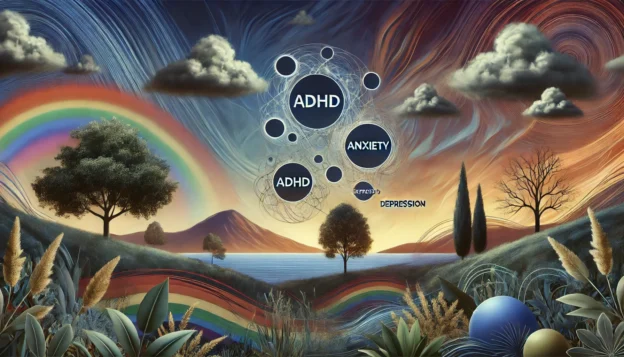This article explores the comorbid conditions often seen in individuals with autism spectrum disorder (ASD), focusing on ADHD, anxiety, and depression. ADHD co-occurs with autism in 30-61% of cases, sharing traits like inattention and hyperactivity, though treatment strategies differ. Anxiety, affecting up to 84% of autistic individuals, includes generalized anxiety and OCD, complicating diagnosis due to overlapping symptoms. Depression, affecting 26% of autistic individuals, arises from social isolation and chronic stress, presenting with symptoms like low mood and sleep disturbances. The article emphasizes the importance of a comprehensive approach to treatment, addressing both autism and its comorbid conditions for improved quality of life.
Introduction
This article explores the common comorbid conditions associated with autism spectrum disorder (ASD), specifically focusing on ADHD, anxiety, and depression. It provides historical context, describes each condition, and examines how these comorbidities intersect and diverge. The article concludes with a subjective opinion on the implications for diagnosis and treatment.
ADHD and Autism
Attention-deficit/hyperactivity disorder (ADHD) frequently co-occurs with autism, with studies suggesting that around 30-61% of individuals with autism also exhibit symptoms of ADHD. Both conditions share certain cognitive and behavioral characteristics, such as inattention, hyperactivity, and impulsivity. However, the treatment and management strategies may differ, necessitating a comprehensive approach that addresses both sets of symptoms (Psych Scene Hub, 2023).
Anxiety and Autism
Anxiety disorders are prevalent among individuals with autism, affecting up to 84% of this population. Types of anxiety include generalized anxiety, social anxiety, and obsessive-compulsive disorder (OCD). The overlap between anxiety symptoms and autism can complicate diagnosis, as signs like repetitive behaviors and social withdrawal are common in both conditions. Effective treatment often involves a combination of behavioral therapies and, in some cases, medication (Autism Research Institute, 2023).
Depression and Autism
Depression affects approximately 26% of people with autism, compared to 7% of the general population. Factors contributing to depression in autistic individuals include social isolation, difficulties in social communication, and chronic stress. Depression in autism can manifest as low mood, changes in appetite, sleep disturbances, and suicidal ideation. These overlapping symptoms necessitate careful assessment to ensure accurate diagnosis and effective treatment (Autism Research Institute, 2023).
Intersections and Divergences
The intersection of ADHD, anxiety, and depression with autism underscores the complexity of managing multiple conditions. While ADHD and autism share certain neurodevelopmental traits, anxiety and depression often arise due to the social and emotional challenges associated with autism. Treatment strategies must therefore be multifaceted, addressing both the core symptoms of autism and the specific comorbid conditions.
Conclusion
Understanding the high comorbidity rates of ADHD, anxiety, and depression in autistic individuals is crucial for providing holistic care. These conditions can exacerbate the challenges faced by autistic individuals, making early diagnosis and tailored intervention essential. An integrated approach that combines behavioural therapies, psychoeducation, and pharmacological treatments where appropriate can significantly enhance the quality of life for those affected.
References
- ADHD and Autism Comorbidity: A Comprehensive Review Based on Expert Consensus Recommendations and Latest Research Findings. (2023). Psych Scene Hub.
- Co-Occurring Conditions and Autism. (2023). Autism Research Institute.
- Understanding and Treating Anxiety in Autism. (2021). Autism Research Institute.
